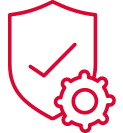In last week’s blog, we looked at how the latest cyber security best practices were strengthening passwords. Today we’re going to look at two other tools that you should be using, to enhance your data security, and protect your digital assets.
Multi Factor Authentication (MFA) and Mobile Device Management (MDM) are both invaluable tools for supporting 4 key areas of alternative investment companies.
But how exactly do these tools work and why do you need them?
Multi Factor Authentication (MFA)
Multi Factor Authentication requires users to verify their identity using two or more authentication methods before gaining access to a system, application, or digital resource. These methods typically fall into three categories:
- Something you know: This includes passwords, PINs, or security questions that only the user should know.
- Something you have: This involves possession of a physical device, such as a smartphone, security token, or smart card, which generates a one-time code or acts as a key to access the system.
- Something you are: This refers to biometric identifiers, such as fingerprints, facial recognition, or iris scans, which are unique to everyone.
By requiring multiple factors before granting access, MFA significantly strengthens security. Even if one factor is compromised, say through a phishing scam, unauthorised access would still need the attacker to possess or replicate the other factor(s) to gain entry. MFA is widely used across various industries and platforms to reduce the risk of unauthorised access and protect sensitive information from cyber threats.
So how does it impact our 4 key areas?
- Data Security: MFA enhances data security by adding an extra layer of protection behind your password. If a password is compromised, unauthorized access is still prevented.
- Compliance: MFA can help alternative investment firms meet compliance requirements by implementing stronger authentication measures and is mandatory to qualify for cyber insurance.
- Risk Management: MFA reduces the risk of unauthorized access to company systems and data, thereby avoiding or mitigating the impact of security breaches.
- Asset Management: While MFA doesn’t directly manage physical assets, it does manage access to digital assets and restrict access to company systems. Providing an indirect deterrent to device theft.
Unfortunately, however, in the modern world this still isn’t enough, as the MFA token can be captured and compromised.
Mobile Device Management (MDM)
The next way to make your environment more secure is Mobile Device Management. A type of security software used to authenticate, monitor, manage, and secure employees’ mobile devices (such as smartphones, tablets, and laptops).
MDM enables IT administrators to remotely enforce security policies, configure settings, deploy software and applications, and perform other management tasks across a fleet of mobile devices.
This includes features like:
- Device provisioning: Setting up and configuring devices for use within the organisation’s network.
- Security enforcement: Implementing security measures such as passcode requirements, encryption, and remote wipe capabilities to protect sensitive data in case of loss or theft.
- App management: Controlling which apps can be installed on devices, managing app updates, and ensuring compliance with licensing agreements.
- Monitoring and tracking: Tracking device usage, location, and compliance with security policies.
- Remote troubleshooting: Diagnosing and resolving technical issues on devices remotely, reducing downtime and improving productivity.
MDM solutions are essential for businesses and institutions that embrace mobile technology in their operations, as they help bolster security while allowing employees to use their preferred mobile devices for work.
MDM impacts the 4 key areas in a different way to MFA providing even deeper security:
- Data Security: Alternative investment companies deal with sensitive financial information and client data. MDM’s security enforcement means this information remains secure, even on mobile devices.
- Compliance: Most financial sector regulators require rigorous data protection measures. MDM allows central management and enforcement of security policies across all mobile devices, proving that regulatory standards are met.
- Risk Management: When employees are visiting clients or working in multiple locations, the risk of data breaches and unauthorised access increases. MDM provides tools to monitor device usage, detect security threats, and respond to incidents promptly.
- Asset Management: Alternative investment firms often have a diverse portfolio and need to manage assets efficiently. MDM helps track and manage company-owned devices, ensuring they are used appropriately.
Summary
In summary, while MDM focuses on securing mobile devices and managing their usage, MFA strengthens overall access security by requiring multiple authentication factors, contributing to data protection, compliance, risk mitigation, and asset security in alternative investment companies.
If you’re concerned you may not have these in place, or would like to have a chat about how to deepen your data protection, contact us here.






